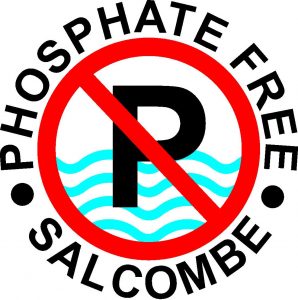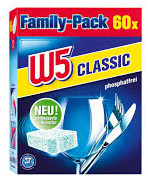The start of a New Year is traditionally the time for resolutions – and each year I press people who live around Kingsbridge and Salcombe to make one simple resolution to improve the water quality of the Harbour. This is to change to phosphate-free dishwasher tablets or powder, in line with the Royal Yachting Association and British Marine’s Green Blue Campaign.
Kingsbridge and Salcombe to make one simple resolution to improve the water quality of the Harbour. This is to change to phosphate-free dishwasher tablets or powder, in line with the Royal Yachting Association and British Marine’s Green Blue Campaign.
This is especially essential for Salcombe because an unusual feature of the Harbour is that it is a ria, a sea inlet (the Norwegians would call it a fjord) without necessarily having a river running through it to make it an estuary. Some rias, like Dartmouth, do indeed have a river running through them: but Salcombe does not.
This makes the Harbour very special. Not having a river means that the upper parts are not flushed through as they would be in an estuary, and there is far less fresh water in the Harbour than there would be if there was a river. There is also far less mud which is why the water is usually sparklingly gin-clear. In turn that means more sunlight on the fundus, and more interesting and rare creatures, which is why the Harbour is one of the very few marine Sites of Special Scientific Interest (SSSI).
All this is threatened by pollution, in Salcombe’s case by nitrates and phosphates. Nitrates give rise to a green algal sludge, easily visible at low tide, particularly around the water treatment works at Gerston. One of the effects of the sludge is to annoy yachties because it clogs up the water cooling inlets for boat engines. Nitrates come from agricultural fertilisers but also (I suspect, mainly, in our case) from urine. Humans, like other mammals, discharge all the nitrogen they breathe in urine. So there’s not much we can do about the nitrates in the sewerage system but South West Water plays its part by having nitrogen-stripping equipment at Gerston.
Phosphates in the Harbour water can also come from fertilisers, but they are more likely to come from detergents, principally now dishwasher detergents (phosphates are banned in laundry products). Phosphates encourage not green but pink algae which give rise to the so-called red tides. The algal bloom is toxic/poisonous, so any shellfish, like oysters, harvested in the upper harbour are banned from sale. But the upper harbour also has many paddleboarders and kayakers, all with their hands in the water.
The remedy is very simple. People who live near the Harbour should never use dishwasher detergents containing phosphates. Phosphates are put into dishwasher tablets to soften water in hard water areas. This part of Devon has soft water so phosphates are not needed here. Sadly, almost all the dishwasher products sold by Tesco and Morrisons in Kingsbridge do contain phosphates.
The solution is to buy Lidl W5 Classic dishwasher tablets, which are proudly proclaimed to be  phosphate-free (be careful not to buy Lidl W5 All-in-One as they contain more than 30% phosphates). If you don’t go to Lidl yourself, find a friend who does and do a deal: no excuses and please spread the word so that you can do your bit to protect the water quality and beauty of the Harbour by going phosphate-free in 2017.
phosphate-free (be careful not to buy Lidl W5 All-in-One as they contain more than 30% phosphates). If you don’t go to Lidl yourself, find a friend who does and do a deal: no excuses and please spread the word so that you can do your bit to protect the water quality and beauty of the Harbour by going phosphate-free in 2017.
Comments are closed, but trackbacks and pingbacks are open.